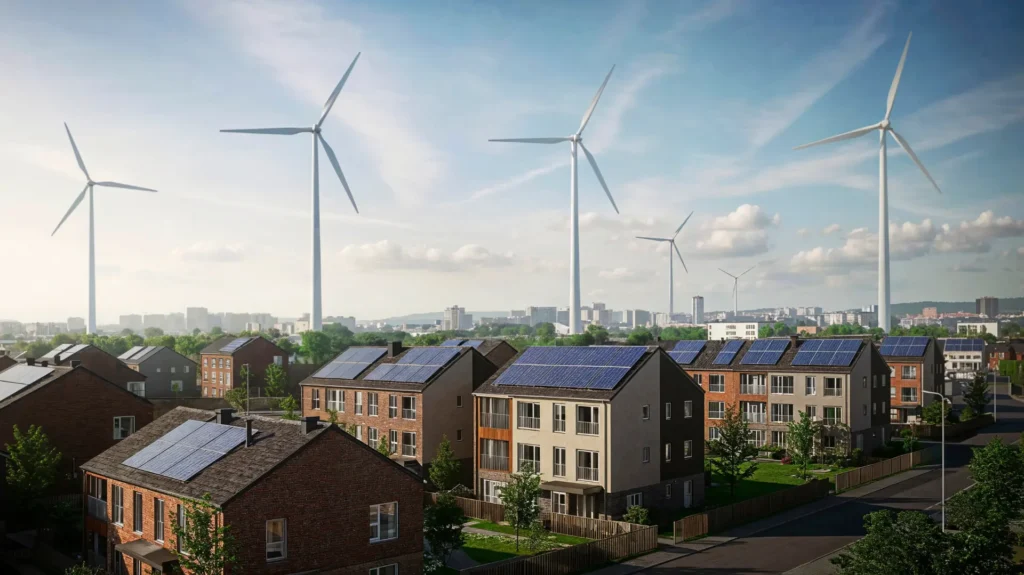
Building the ESG Skillset: What You Actually Learn and Why It Matters!
The ESG agenda is moving faster than most corporate strategies can catch up with. What was once a boardroom side topic has now become a core filter for…

The global momentum behind renewable energy is no longer just a vision—it’s an imperative. Yet, as we move through 2025, the path forward is not without friction. Despite the historic pledges made during COP28 and the intensified focus on financing during COP29, the reality is that geopolitical instability, uneven regulatory progress, and infrastructure bottlenecks continue to temper the pace of transition from fossil fuels.
At IFRSLAB, we believe this isn’t a signal of regression—it’s a call for recalibrated, smarter ambition. The challenge now is less about setting net-zero targets and more about confronting the granular, system-level changes required to achieve them.
In 2024, the world added over 500 GW of renewable capacity, and projections by the International Energy Agency (IEA) indicate that by 2030, over 5,500 GW will be installed globally. China alone is expected to contribute 60% of this expansion, while the EU pushes forward with policies aimed at achieving 42.5% renewable energy share by the decade’s end.
Despite these figures, renewable energy still faces fundamental roadblocks:
This divergence between ambition and execution requires a closer look at how sustainability strategies are financed, managed, and governed—particularly in emerging markets where institutional capacity remains underdeveloped.
One of the most significant outcomes of COP29 was the global commitment to mobilize $300 billion annually by 2035 for climate-vulnerable and developing nations. This level of finance is intended to accelerate renewable energy deployment and resilience measures. However, turning this financial ambition into credible pipelines of bankable projects is a complex task.
Here’s where ESG-focused investment strategies and climate risk governance frameworks must evolve. Investors are increasingly seeking:
Energy systems are becoming more electrified—but fossil fuels remain dominant in hard-to-abate sectors like aviation, shipping, and heavy industry. The shift to drop-in alternatives such as Sustainable Aviation Fuel (SAF), renewable diesel, and bio-methanol is a crucial part of the renewables story in 2025.
Here’s the strategic pivot: success will depend not just on technological readiness but on how companies manage feedstock sourcing, lifecycle emissions, and policy alignment.
For example:
IFRSLAB works with clients across energy, manufacturing, and logistics sectors to map decarbonization pathways that integrate renewables into both operations and product lifecycles.
The challenge with renewables is no longer just about whether we transition—it’s about how ready we are to transition. Businesses must start answering:
This is where carbon accounting, GRI-based ESG reporting, and science-based targets converge to offer a meaningful picture of progress.
At a time when the energy transition narrative is being reshaped by real-world friction, companies must respond with realism, resilience, and rigor.
The renewables challenge of 2025 is not a step back—it is a recalibration. One that demands:
Whether you’re a multinational recalibrating your decarbonization strategy or an SME looking to future-proof operations, IFRSLAB can help translate global energy goals into tailored, actionable sustainability strategies.

The ESG agenda is moving faster than most corporate strategies can catch up with. What was once a boardroom side topic has now become a core filter for…

In 2025, sustainability is no longer an optional conversation for businesses. It has become a measurable responsibility, enforced by regulation and demanded….

As Environmental, Social, and Governance (ESG) factors move to the forefront of business strategy, demand is rising for professionals equipped….

UAE : (+971) 52 710 0320 PAK : (+92) 300 2205746 UK : (+44) 786 501 4445
Office 2102 Al Saqr Business Tower 1, Sheikh Zayed Road
S-25, Sea Breeze Plaza Shahrah-e-Faisal, Karachi
Office#1304, 13th Floor, Al Hafeez Heights, Gulberg III
104 Broughton Lane Salford M6 6FL
P.O. Box 71, P.C. 100, Muscat


Lorem ipsum dolor sit amet, consectetur adipiscing elit. Ut elit tellus, luctus nec ullamcorper mattis, pulvinar dapibus leo. Lorem ipsum dolor sit amet, consectetur adipiscing elit. Ut elit tellus, luctus nec ullamcorper mattis, pulvinar dapibus leo.
Get Every News By Signing Up To Our Newsletter
Typically replies within a day